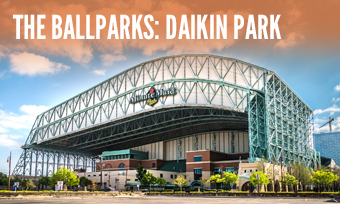THE TEAMS
Houston Astros
Known as the Houston Colt .45s, 1962-64
THE ASTROS BY THE DECADE
The 1960s
Originally named the Colt .45s, the franchise began playing in a temporary ballpark that housed few fans but many killer mosquitoes in concert with oppressive heat and humidity; a move to the space-age, air-conditioned Astrodome in 1965 generated a huge buzz and increased attendance, but the rebranded Astros remained the same team on the field: A second-division straggler with moments of sterling pitching but a serious deficit of hitting, despite the emerging (but mostly raw) talents of Jim Wynn, Joe Morgan and Rusty Staub.
The 1970s
The Astros evolved into a more competitive, yet not necessarily contending, organization, often finishing at or just around the .500 mark. If their play didn’t get people’s attention, their uniforms sure did; in 1975, the Astros began wearing a horizontally bright mix of warm colors on the bottom half of their jersey tops, initiating a fashion revolution in the majors. The team’s stars of the decade were almost as flashy, from dynamic outfielders Cesar Cedeno and Jose Cruz to the wild fastball theatrics of 6’8” J.R. Richard.
The 1980s
Further improving, the Astros got their first taste of the postseason, twice winning the NL West—but succumbing both times in the NLCS (to the Phillies in 1980, the Mets in 1986) in remarkably tight, entertaining and ultimately heartbreaking efforts. Singles and speed continued to be the team’s offensive mantra, with only Glenn Davis arriving as a legitimate power threat late in the decade; the rotation was superb, anchored by Nolan Ryan, Joe Niekro and, later in the decade, dominant split-finger ace Mike Scott.
The 1990s
The team’s final decade in the Astrodome was sweetened by the arrival of two offensive forces who seemed inseparable from one another: Intimidating free swinger Jeff Bagwell and the fast, amiable but tough-as-nails Craig Biggio. The Astros followed up three second-place finishes in the mid-1990s with three NL Central crowns to finish the decade—but were flattened out each time in the first round, dropping their all-time postseason series record to 0-6.
The 2000s
The Astros moved into lovely new Daikin Park (originally named Enron Field) in 2000 and continued their winning ways, with Lance Berkman joining the “Killer B” tandem of Bagwell and Biggio while Roy Oswalt emerged as a tenacious ace on the mound, complemented by interim tours from Roger Clemens and Andy Pettitte. The team’s upswing peaked in 2005 when it survived a 15-30 start, took the wild card spot and rammed its way to its first-ever World Series—where it got swept by the Chicago White Sox. From there, the Astros gradually regressed, failing to reload new talent for the future.
The 2010s
Increasingly lifeless, the Astros appeared burned out under owner Drayton McLane, who sold the team in 2011. New lord Jim Crane all but started from scratch (and in a new circuit, as MLB ordered a relocation to the American League), overseeing three straight 100-loss seasons before an impressive rebound ultimately led them to three straight 100-win campaigns, returning to the postseason in 2015 and, two years later, their first-ever world title with an exhilarating seven-game triumph over the Los Angeles Dodgers. But after another AL pennant in 2019, it was revealed that the Astros’ burst of winning had coincided with a complex and effective sign-stealing scheme that resulted in fines, loss of draft picks, and the firings of manager A.J. Hinch and general manager Jeff Luhnow. All of this cast a pall over an excellent roster of talent that included dynamic second baseman Jose Altuve, exciting third sacker Alex Bregman and late-decade pitching acquisitions in Justin Verlander and Gerrit Cole.
The 2020s
The fallout from the cheating scandal failed to recede on social media or at opposing ballparks, where irate fans hounded the Astros with a deafening barrage of boos, hostile signage and banging trash can lids. But the Astros remained focused and defiant—running up a streak of consecutive ALCS appearances to seven, winning another pair of AL pennants and capturing the 2022 World Series over an upstart Philadelphia team. Post-scandal newcomers maintaining the Astros’ top-flight standard was veteran manager Dusty Baker, potent boomer Yordan Alvarez and star pitchers Framber Valdez and Hunter Brown.
Highlights of the Astros’ History on This Great Game:
 1986: An October for the Ages Behind the untouchable split-finger fastball of Mike Scott, the Astros take part in an unforgettable postseason full of sensational comebacks and spirited performances.
1986: An October for the Ages Behind the untouchable split-finger fastball of Mike Scott, the Astros take part in an unforgettable postseason full of sensational comebacks and spirited performances.
 2005: At the End of the Primrose Path In a year dominated by steroids talk, the Astros charge from a horrible start and capture their first-ever National League pennant before meeting their match in the Chicago White Sox at the World Series.
2005: At the End of the Primrose Path In a year dominated by steroids talk, the Astros charge from a horrible start and capture their first-ever National League pennant before meeting their match in the Chicago White Sox at the World Series.
 2017: Astronomical! (The Scandalous Cut) The Astros defeat the favored Dodgers in an exhilarating and exhausting seven-game World Series—but the trophy will soon be tarnished.
2017: Astronomical! (The Scandalous Cut) The Astros defeat the favored Dodgers in an exhilarating and exhausting seven-game World Series—but the trophy will soon be tarnished.
 2022: Houston Again, Honestly Five years after cheating their way to their first World Series title, the Astros return to baseball’s mountaintop—this time without fraudulence.
2022: Houston Again, Honestly Five years after cheating their way to their first World Series title, the Astros return to baseball’s mountaintop—this time without fraudulence.




